- Home
- Giles Foden
1999 - Ladysmith Page 8
1999 - Ladysmith Read online
Page 8
“I don’t see how this squares with what you were saying last week,” he ventured.
Steevens looked back at him. “It’s the vital ideal of Empire one must hang on to—however tawdry the reality, however full of outrageous postures and cheap tricks. We’ve got to keep aiming at something beyond the truth. I suppose, at base, it is all to do with spreading light.”
“Or what we think of as light. I don’t understand you, George. I hope you don’t mind me saying it frankly.”
“How do you mean?” Steevens seemed almost pleased that his character should be seen to give rise to such confusion; if Nevinson had been a malicious man, he might have styled the expression his colleague wore as one of arrogance.
“I mean…You’ve been about, seen a bit of life, and yet you still have these high-flown notions. The Mail will have you writing leaders soon if you carry on in this vein.”
“Already do, sir, already do.”
“I might have known.”
Suddenly brisk, Steevens brought his feet down off the table. “Sleep calls me to her bower. MacDonald’s already gone up. I think all this shelling has knocked the stuffing out of him.”
He stopped at the door. “By the way, you know there’s this meeting tomorrow. I’m going to go along.”
“So am I,” said Nevinson, as the door closed. He went over to the water-jug to pour himself a glass to take upstairs, and found it empty. He held the iron jug in his hand and lifted it, weighing its emptiness, and once more said to himself, so am I.
Eleven
“So I am meant to run away, Mr Kiernan? Personally, I should have thought that a very un-British action.”
“And your view is that we should just sit here, letting our families be blown to pieces?”
Mr Grimble—a bearded, beak-nosed gentleman—and the red-headed Leo Kiernan stood on either side of the podium. The other civic dignitaries were still seated at the long table behind. The audience were seated on wooden chairs, or crowded at the back. As someone had remarked, it was the first meeting of the town council ever to have been attended by large numbers of the public. Bella, the correspondents—Nevinson, Steevens, MacDonald—and Torres the barber were among the audience.
“Come, come,” said Farquhar, the mayor. “We’ve got enough to worry about without falling out amongst ourselves.”
“That’s right,” said the military censor, Major Mott, who was representing the army. “We’ve all got to work together. It’s the only way.”
The occasion of the meeting had come out of an earlier request by the council to General White—namely, that he communicate to Joubert a message asking that all wounded and non-combatant civilians in the town be allowed to evacuate southward. This the General had done—reluctantly, since it smelt of cowardice.
Major Mott now had the paper sent back by Joubert in his hand. He read it out to the assembled company: “Respecting your request that the townspeople may be allowed to leave for the South, this I cannot possibly agree to. The wounded, with their attendants and doctors, may, as requested by you, be taken to a chosen place, and I shall agree that the people of the town shall also be removed there. The numbers of the civilians must be communicated to me and the removals of the wounded and civilians must be effected within twenty-four hours of the receipt of this, and the locality must be distinctly marked. I must further make it a condition that under the name of civilian there must not be sent out any who have taken up arms against the Republic.”
People were shouting by the time Mott had finished. “How dare he make such demands?” said one. “We shall not be dictated to in this way,” said another.
And then the Major continued: “General White has agreed to these terms, and suggested the establishment of a neutral camp at Intombi Spruit. He advises the town to accept the proposal.”
Again there were cries of indignation. One man flamboyantly pulled out his white handkerchief and said, “This is not my banner. I am a patriot and shall not be known by the name of coward. It is right that we should put our lives in danger for the Queen.” Then, with theatrical defiance, he flung the kerchief on the floor.
Others, in particular those who had suffered injury to family or property from the bombardment, were all for leaving the soldiers to it and getting out from under the shadow of shell.
Leo Kiernan was one of those who spoke in favour of accepting the offer.
“It would be criminal not to allow non-combatants to take advantage of this arrangement,” Bella heard him saying. But her father was again roundly shouted down by Grimble. He was one of the local farmers (mostly fruit, with a bit of arable thrown in), and a leading light in the Carbineers, the settlers’ volunteer force.
“We humble ourselves too much to ask for the forbearance of such scoundrels,” he now said. “I suppose we shall be knocked about a good deal, but, well, I am getting old, and care little about danger these days. I will not leave my property.”
“Sir, there are other lives at stake than your own,” said Bella’s father. “They must be considered.”
Archdeacon Barker—who, tall and dog-collared, had the benefit of divine authority—eventually carried the day. “Our women and children shall not go out under a white flag. They shall stay with the men under the Union Flag, and those who would do them harm may come to them at their peril.”
There were loud cheers—though not from Bella’s father, who looked cross. The decision having been made, the townsfolk filed out of the hall, the low chunter of their discussions filling the interior air until, as they passed out into daylight, it was swallowed up by the noise of horse and soldier and the distant boom of shell. It was too far away to be the Boers…could it, wondered Bella and a hundred others, be Buller?
As she walked back to the hotel behind her father, Bella reflected that he was a respected curiosity in Ladysmith. Various women had set their cap at the widower, but he had rebuffed them all; the only intimacy he kept was his own, and the only things he cared about in the world, she believed, were his daughters and his hotel. Now all three were in jeopardy.
He turned round. “You go on back. I’m going to the Commissariat to see what I can squeeze out of them. Perhaps you might clean up the stoep this morning. I notice it has become very dusty.”
It was a strange way of referring to the near miss that had thrown a shower of debris on to the porch of the Royal on the first day of shelling. Bella had already swept most of it away, but there was still a fine coating of red dust all across the wooden boards.
“Very well,” she said.
She watched him try to cross the road, waiting for a gap to appear in the khaki and brown thicket of horse and man that filled the street.
Back at the hotel, Bella took out a mop and bucket and set to work, dragging the little tails of the mop across the wood and then curling them up in the bucket drainer. Lifted out, the mop head would hold its moulded shape for a second, and then collapse again into a hundred dull grey strings.
“The mountains look pretty, don’t they, Miss Kiernan?”
She had been so absorbed that she didn’t think the voice was addressing her.
“Don’t you think?”
She looked up, surprised, to see Tom Barnes on his horse.
“I was saying,” he called down, “that you have a nice view from here.” He gestured out above the town, towards Bulwan and the other hills, stretching green and blue into the bright, mid-morning sky.
“Why, yes ., .” She stopped mopping and leant against the mop handle. The soldier’s horse stamped and moved to one side, uneasy at having to wait while the rest of the squadron passed by.
“Shame them Boer guns are up there, or I’d take the liberty of asking you for a hill walk one afternoon.”
Bella blushed and pulled the mop handle into her chest.
“I suppose it is a shame,” she said, trying to compose herself in view of the massed eyes of the body of men, as they moved behind the soldier.
“I would say so,” he
said, and smiled. “Perhaps I might come by some time, and my friend Foster too, to see you and your sister.”
“Perhaps you might,” she replied, a little bolder.
His mates were laughing at him now, and when he raised his helmet in farewell, several others did the same in mockery. Bella blushed again, lifted four fingers from the mop handle to offer a modest wave, and then stood back to watch the rest of the column pass by. As she watched, her eyes slowly focused on something else beyond them: the stout figure of her father approaching from the other side of the street. He came up the steps and stared at her hard as he went through into the bar.
The afternoon brought shelling—already it had become a matter of course—and, once the bar had closed, the night found Bella sitting in the parlour mending a blouse. She could hear the clatter of bottles and crates from next door as her father cleared up.
Later he came in, and sat down next to her.
“It frightening you, Bel, this shelling?”
She looked up, surprised. He rarely addressed her with this pet name, which was one mainly used by Jane.
“Not so much, Father.”
“Don’t let the soldiers talk coarsely to you.”
“I won’t, Father.”
“Good girl.”
He got up and made his way to the door. Reaching it, he paused with his hand upon the knob. Her eyes took in his thickset body and clothes—his laced-up heavy boots, his legs in brown corduroy, the auburn hairs on his strong forearms (his shirt-sleeves were rolled up), and the way his head, with its close-cropped red hair, sat low, like a ball of lichen-covered stone, upon his broad shoulders.
“Sleep tight,” he said, without turning round.
Her father passed through the doorway then, and she heard his feet upon the stairs, and was happy. For there was a bond between them, after all. The thought ran through her head that she should run after him and throw her arms around him on the landing, but she felt as if she had been pinioned to the chair, and sat there for some minutes afterwards immobile, the light from the lamp throwing strange, mesmeric shadows all around her.
Brushing her hair in their bedroom that night—using her new looking-glass, she was sitting in her nightgown on the window seat—Bella related to Jane what the soldier had said, how he and the naval gunner wanted to come and see them.
“Herbert is a silly name,” said Jane, sitting up in her bed. “But his manner is pleasing. What do you think of yours?”
“I don’t know. He’s not overbearing, and I like that, and he seems as though he might be reliable as well as charming; those are the qualities I would want in a man, sis.”
Jane made a noise, a kind of disparaging sigh which expressed both impatience and amusement. In the looking-glass, Bella saw her raise her eyebrows.
“Who cares about that, right now? We’re in the middle of a siege, Bella, in case you hadn’t noticed. The point is, do you like the look of him?”
“I’m serious, Janey. I want to leave here. I want to see more of the world, and I want the kind of husband who will let me run my own household. I can’t see that happening with anyone in Ladysmith.”
“So you reckon this soldier’s your best chance?”
“Perhaps.”
“You couldn’t leave me here with Father. It’s not fair. Anyway, your Tom could be killed any day.”
Bella put down her looking-glass and brush and made her way over to her bed, getting in without saying anything.
“Honestly, Bel, you’re too moony for words. You haven’t even done anything with him yet. You never think things through.”
“It’s not him, really,” said Bella, looking at the lamp flickering on the wall. “I’m just feeling a bit wretched about—about everything.”
“What?” said Jane, slightly impatiently.
“You know…what I said before. Father, working here…not to mention the siege.”
“It’s just how things are. We can’t change it.”
“It would be better to be a man.”
“Is that why you cut your hair off?”
“I don’t know. I never thought of that.”
“Well, it looks all right all the same. Maybe it will catch on. Anyway, night-night.”
She blew out the lamp.
“Night-night,” said Bella, into the darkness.
Twelve
If you drew a line, crossways, from Bella to the starlit mountains of the Berg, it would pass through Torres’s shop on Keate Road. There, sat in his leather chair, his feet upon the counter, the barber was drinking a glass of sherry. Its golden liquid was illuminated by the glow of a candle which, burning with absolute steadiness, also shined up still further his well-polished boots. His thoughts turned on manes extravagant: in particular, the triple coil of his lost love, dark-haired Isabella Teixeira de Mattos. Where was she now, he wondered, that other Bella? Caressing her husband? Undressing herself before going through to him? His spirit soured at the thought.
Yet in truth it was not bitterness he felt, but a strange wistfulness. It seemed odd, more than anything, that they would never again walk arm in arm through the lovely streets of the city, as they had used to do. One day in particular had retained its place in his memory, a Sunday at the end of the long rains when they had visited the municipal rose gardens after Mass. It was a time of year when the dark earth swelled with life; chameleons turned an unnatural green to keep in with the new shoots of grass, and the tight pink buds of the roses appeared to open every instant.
With Mass over and the clouds of morning gone, they had strolled together between the flower beds, small white pebbles from the Mozambique Channel crunching beneath their feet and the great sky of hope above. Isabella was wearing a delicately embroidered green mantilla, he recalled, which rustled slightly as she walked. In those days, it had never occurred to him that he would not marry her; but even at its height, that very day, their love was intent with its own loss—just as, had they inspected them, the new petals would have revealed blackspot and mildew.
He remembered her removing her arm from his own with gentle awkwardness, and then turning towards him. As she did so, the green covering that shaded her eyes fell back, revealing her pale, aristocratic face. He thought she was about to allow him to kiss her, but instead she spoke.
“You must know.”
“Must know what?” he replied.
“It is Luis who is the choice.”
Her eyes quickened with grief, and then she pulled her mantilla about her and ran away from him. Once more, from far away in Ladysmith, he beheld her figure as it fled through the flower beds in the direction of the glimmering square where, sitting on a bench outside the cathedral, her chaperone awaited her. Bewildered, he had sat down under a bit of broken tree. He must, he recalled, have sat there for hours, staring at the white pebbles, for by the time he went home it was evening and the moon above the city was a hard pebble itself and the streets had become unlovely.
Torres heaved a sigh. He should have rescued her from that hidebound world, not run away from it himself…
The vista of the years resolved itself in his barber’s mirror, where he found he was reflected. The flame of the candle, disturbed by some parvenu draught, was flickering now, playing about his and its own image. Standing up, he shook himself and, picking up his glass, went out on to the porch to finish his sherry. As he stood there, looking out into the infinite country of the night, he heard—over the whisper of the oil lamp hung by the door—the faintest pad-pad-pad.
Across the street, a shape emerged, silvered by moonlit rays. Suddenly, there at his feet, was a flap-eared, long-tailed dog. He recognized it as a pointer. His father had had one for hunting, its keen tail signalling anything from duiker to partridge; even trout once, wading into a stream near Beira. Crouching down, he put his glass on the boards and patted the animal on the head, and then went upstairs to his lodgings to find it something to eat. But there was nothing in the meat safe, and when he came back down the dog was gone
. He went to bed wondering if it had been a ghost.
Thirteen
Intombi Camp was about four miles south-east of the town, down the railway line. The first train during the twenty-four-hour ceasefire had left about five o’clock the day after the meeting—a great long snake of a thing filled up with wounded lying in their green ‘coolies’, as the litters were called, and with tearful women and children, and not a few of Ladysmith’s menfolk. The moans of agony coming from beneath the green covers, as the coolies lay in the station yard waiting to be loaded, had been terrible to hear.
This, as everything, had to be recorded. Every day, Nevinson would take his report to the censor, Major Mott—a man who, according to MacDonald, ‘combined the directness of the soldier with the literary sagacity of the sub-editor’. Since the telegraph had been cut, it was increasingly difficult to get messages in or out by any means: the proposed heliograph link had not yet been established, and some correspondents were making use of the homing pigeons.
It was a method Nevinson had found to be unreliable. The only other options, so far, were the official military messengers or amateur kaffir boys. All put their lives in danger. Sometimes the enemy took the runners in for questioning; sometimes they shot them on sight, like the pigeons. As a consequence of the danger, the boys (it was a cant term, since many of them were fully grown men, and others could only be described as old) were charging £20 or more either way. This was a preposterous figure, as it was far, far more than they might earn in a year; but considering the trip might cost them their lives, he supposed it was a bargain. And it could indeed be a journey that would cost them dear, since the Boers had laid bell wires everywhere to alert them to any movement.
If an official runner was used (and under the martial law that now governed Ladysmith, it was strictly illegal to use any other), the message had to go through Major Mott. In the early days, when the British still had the telegraph wire, he had been harsh; in these present times he was merciless. The slightest suggestion in a correspondent’s copy of Imperial weakness would be struck out in red ink—even the notion that the town needed the relief column to arrive at all. As the Boers knew this was not the case, and the British knew this was not the case, and the Africans and Indians caught in the middle knew it also, the process was clearly a nonsense.

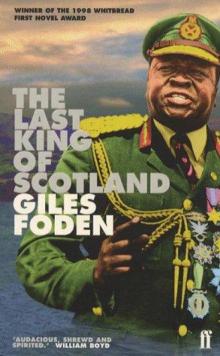 The Last King of Scotland (1998)
The Last King of Scotland (1998) Zanzibar
Zanzibar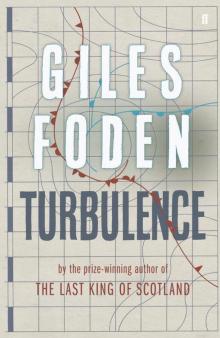 Turbulence
Turbulence The Last King of Scotland
The Last King of Scotland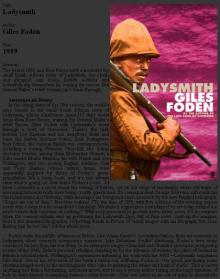 1999 - Ladysmith
1999 - Ladysmith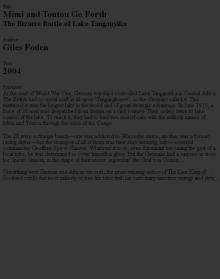 2004 - Mimi and Toutou Go Forth
2004 - Mimi and Toutou Go Forth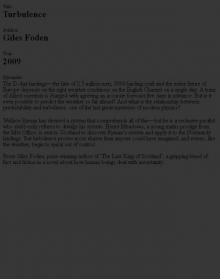 2009 - Turbulence
2009 - Turbulence